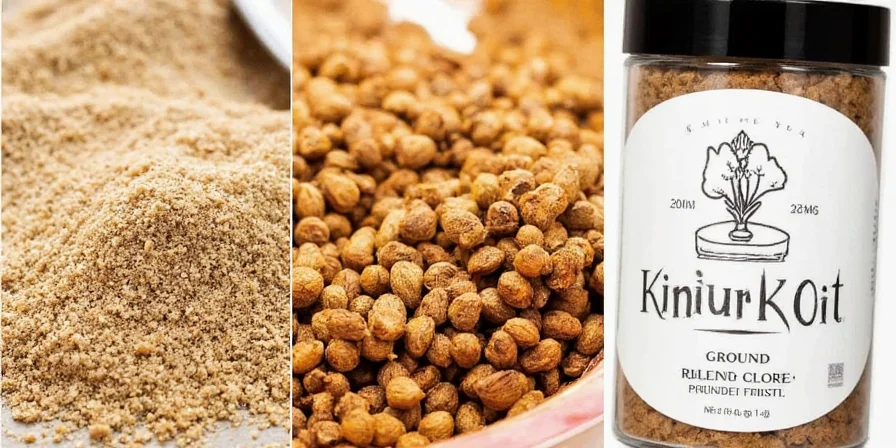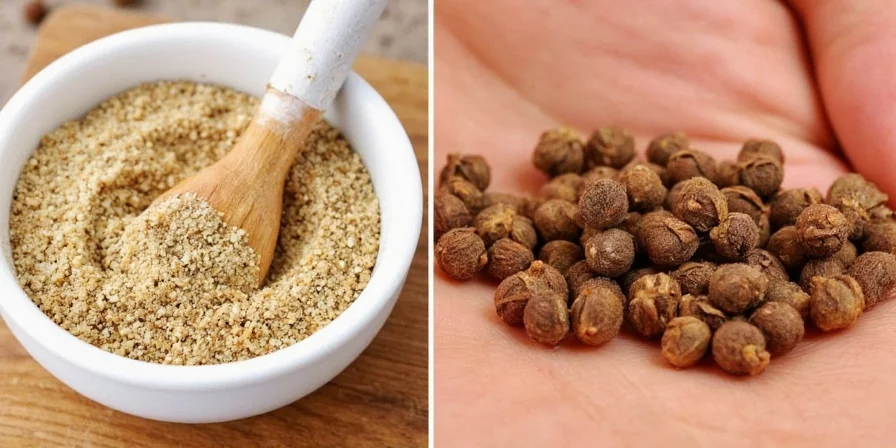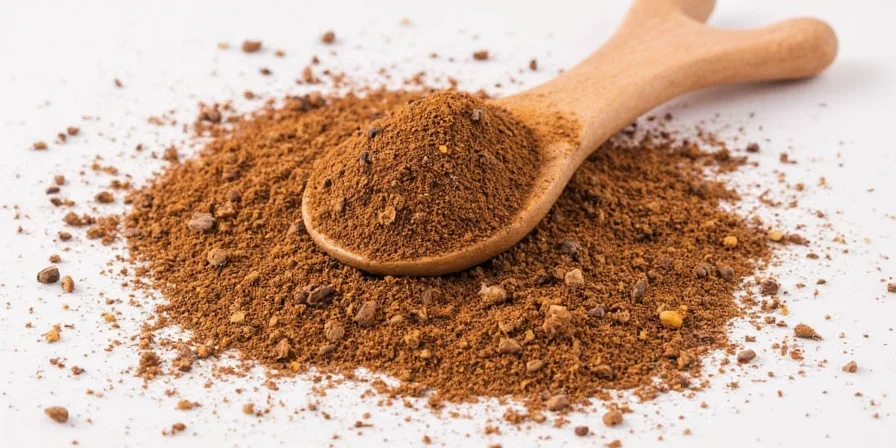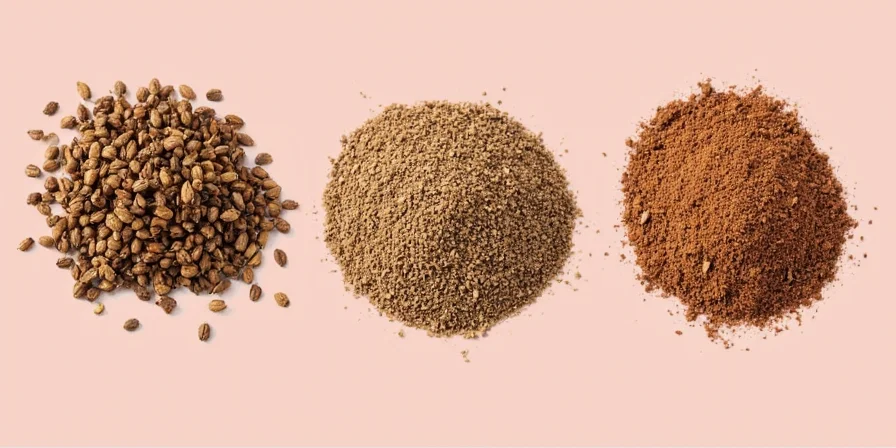If you're searching for ground cloves substitutes, you need precise answers immediately. Allspice is the closest 1:1 replacement due to its high eugenol content (the key compound in cloves). For baking emergencies, use half the amount of nutmeg combined with cinnamon. For savory dishes, star anise works best at half the quantity. Here's exactly when and how to use each substitute based on scientific flavor matching principles.
Table of Contents
- Why You Need the Right Substitute
- Top Ground Cloves Substitutes Ranked by Effectiveness
- The Science Behind Clove Substitution
- Proven Substitution Techniques
- Quick Reference: Ground Cloves Substitution Guide
- Critical Questions Answered
Why You Need the Right Ground Cloves Substitute
Ground cloves contain 70-90% eugenol, creating their distinctive warm, slightly numbing flavor. Using the wrong substitute can ruin recipes because:
- Clove's high eugenol content dominates flavor profiles
- Incorrect ratios cause bitter or unbalanced results
- Some substitutes work only for specific dishes (baking vs. savory)
Running out of cloves during holiday baking or while preparing cultural dishes like biryani creates urgent need for accurate replacements.

Top Ground Cloves Substitutes Ranked by Effectiveness
Allspice (Best Overall Substitute)
Why it works: Contains 4-7% eugenol (compared to cloves' 70-90%), plus cinnamon and nutmeg compounds.
Perfect for: Baking, stews, marinades, mulled wine
Precise ratio: 1:1 replacement (1 tsp cloves = 1 tsp allspice)
Critical tip: Use Jamaican allspice for highest eugenol content. Avoid overuse in delicate recipes like pumpkin pie.
Nutmeg (Best for Baking)
Why it works: Shares warm terpenoid compounds but lacks eugenol's intensity.
Perfect for: Gingerbread, spice cakes, apple pie
Precise ratio: 1 tsp cloves = ½ tsp nutmeg + ¼ tsp cinnamon

Critical tip: Always combine with cinnamon for complete flavor replication. Freshly grated works 30% better than pre-ground.
Star Anise (Best for Savory Dishes)
Why it works: Contains anethole (licorice compound) that complements clove's warmth in braises.
Perfect for: Pho broth, beef stew, Chinese five-spice dishes
Precise ratio: 1 tsp cloves = ½ tsp ground star anise
Critical tip: Remove whole star anise after 30 minutes cooking to prevent overpowering licorice flavor.
The Science Behind Effective Clove Substitution
Clove substitution success depends on matching three chemical components:
- Eugenol content (primary flavor compound - 70-90% in cloves)
- Caryophyllene levels (spicy, woody notes)
- Vanillin presence (sweet undertones)
Most substitutes fail because they only address one component. The most effective replacements combine spices to match multiple compounds:
- For baking: Nutmeg (caryophyllene) + cinnamon (vanillin)
- For savory: Allspice (eugenol) + black pepper (piperine for heat)
Proven Substitution Techniques Used by Professional Chefs
- The 15-Minute Test: Add substitute to a small portion of your recipe, cook 15 minutes, then taste. Clove flavors intensify over time.
- Layering method: For complex dishes, use two substitutes (e.g., ¼ tsp allspice + ¼ tsp nutmeg = 1 tsp cloves).
- Emergency blend: Mix equal parts cinnamon, nutmeg, and allspice (¼ tsp each replaces 1 tsp cloves).
- Avoid these mistakes: Using too much ginger (overpowering heat) or pure cardamom (citrus clash with clove's warmth).
Quick Reference: Ground Cloves Substitution Guide
| Substitute | Best For | Precise Ratio | Key Compound Match | When to Avoid |
|---|---|---|---|---|
| Allspice | General purpose, baking, stews | 1:1 | Eugenol (4-7%) | Delicate desserts like vanilla cake |
| Nutmeg + Cinnamon | Baked goods, pie fillings | ½ tsp nutmeg + ¼ tsp cinnamon per tsp cloves | Caryophyllene + Vanillin | Savory meat dishes |
| Star Anise | Braises, broths, Asian cuisine | ½ tsp ground per tsp cloves | Anethole | Sweet baking applications |
| Cinnamon | Cookie dough, oatmeal, chai | 2 tsp per tsp cloves + pinch pepper | Vanillin | Recipes needing sharp clove bite |
| Ginger | Gingerbread, spice cookies | ⅔ tsp ground per tsp cloves | Gingerol | Most savory applications |
Critical Ground Cloves Substitute Questions Answered
What's the exact ratio for allspice instead of ground cloves?
Use a precise 1:1 ratio (1 teaspoon allspice = 1 teaspoon ground cloves). Allspice contains measurable eugenol (4-7%) making it the only true 1:1 replacement. For delicate recipes like pumpkin pie, reduce to ¾ teaspoon allspice per teaspoon of cloves to prevent flavor dominance.
Can I use cinnamon as a ground cloves substitute in cookies?
Yes, but use 2 teaspoons cinnamon per 1 teaspoon cloves plus a pinch of black pepper. Cinnamon lacks eugenol but provides vanillin compounds. The black pepper adds piperine that mimics clove's slight heat. Never use cinnamon alone - it creates unbalanced sweetness without clove's complexity.
What's the best substitute for ground cloves in biryani?
Star anise is superior for biryani (½ teaspoon ground star anise = 1 teaspoon cloves). Its anethole content complements rice dishes better than allspice. Add during the tempering stage with other whole spices. Avoid nutmeg-based substitutes which overwhelm biryani's delicate spice balance.
How much nutmeg equals 1 teaspoon of ground cloves?
Use exactly ½ teaspoon nutmeg plus ¼ teaspoon cinnamon to replace 1 teaspoon ground cloves. Nutmeg alone provides only 60% of clove's flavor profile - the cinnamon adds necessary vanillin compounds. Pre-ground nutmeg loses 30% potency, so use ⅔ teaspoon if not freshly grated.
Why does my clove substitute taste bitter?
Bitterness occurs when substitutes exceed proper ratios or cook too long. Clove's eugenol breaks down after 20 minutes, but substitutes like allspice continue intensifying. Fix: Reduce substitute quantity by 25% and add during final 10 minutes of cooking. For baking, mix substitutes with dry ingredients to distribute evenly.

Successful clove substitution requires understanding flavor chemistry, not just swapping spices. The critical factor is matching eugenol content and complementary compounds. When you need ground cloves substitutes for baking emergencies or cultural recipes, these precise ratios prevent kitchen disasters. Remember: professional results come from scientific understanding of spice compounds, not guesswork. Implement these exact measurements to save your recipe immediately.











 浙公网安备
33010002000092号
浙公网安备
33010002000092号 浙B2-20120091-4
浙B2-20120091-4